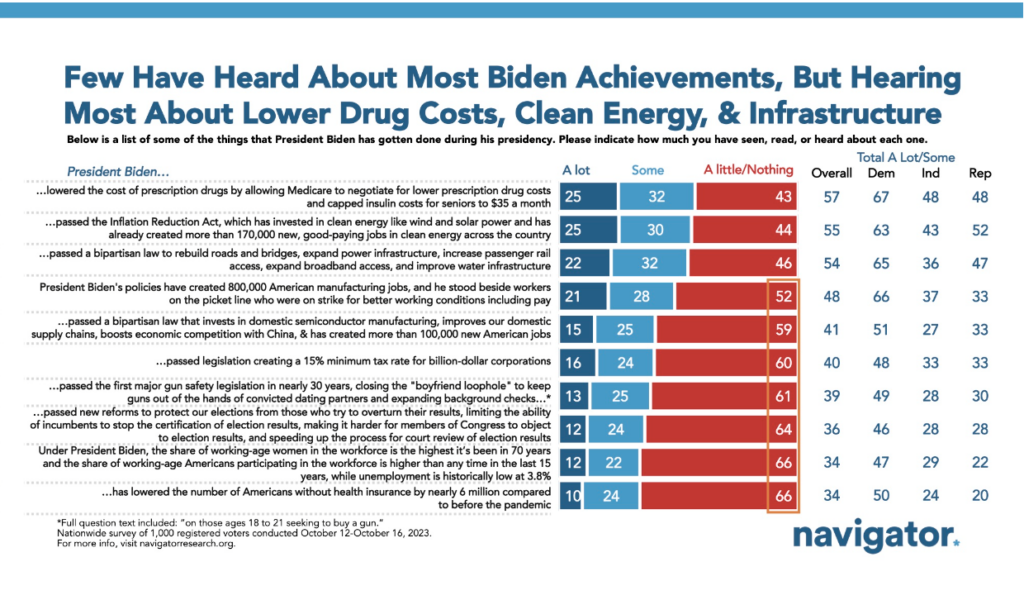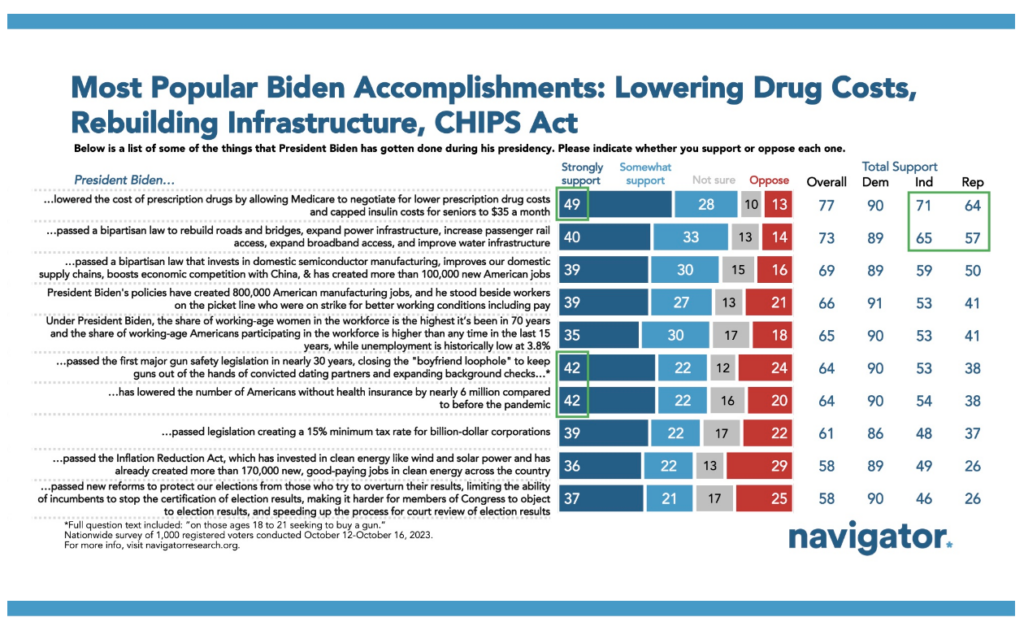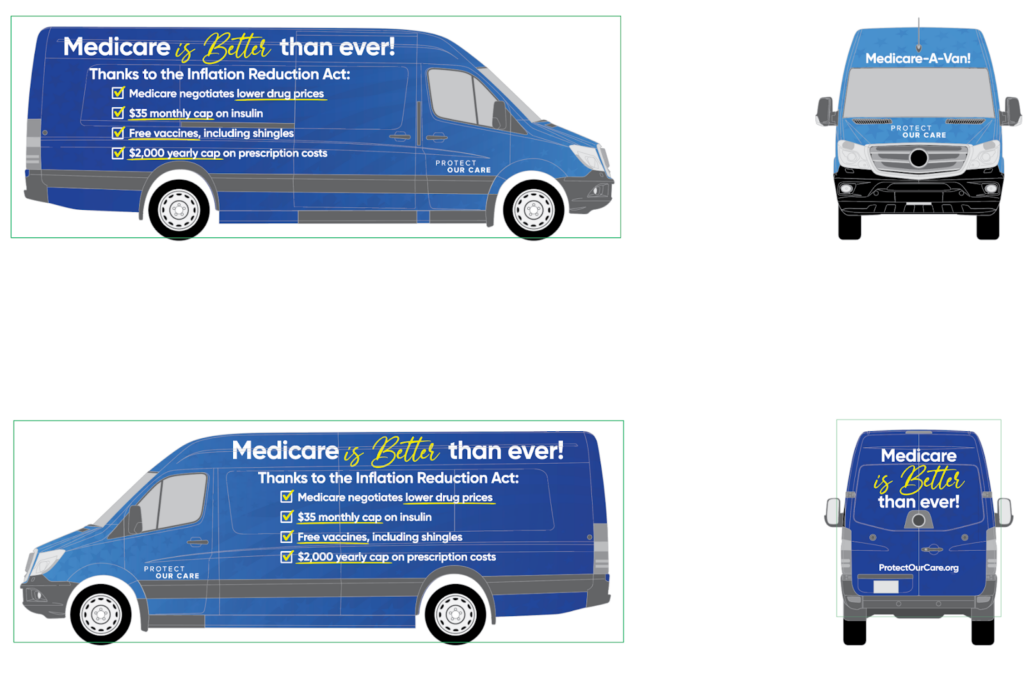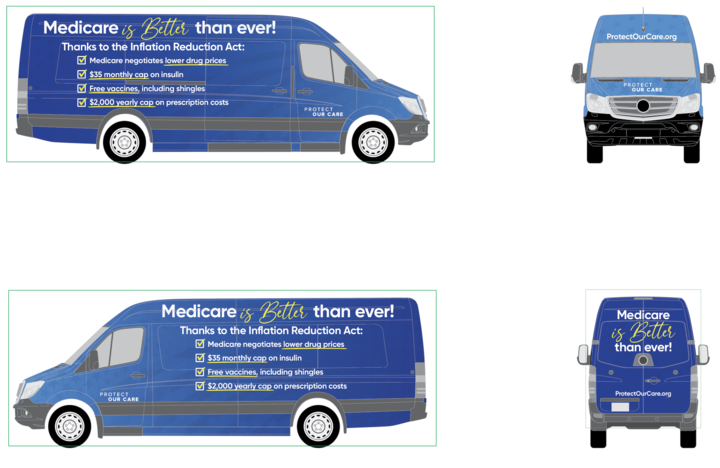Across the country, health care experts, lawmakers, and advocates are celebrating the Inflation Reduction Act’s provisions to drive down health care costs for seniors. From New York to Nevada, op-eds from 10 states across the nation make clear that Americans of all walks of life need relief from the skyrocketing cost of prescription drugs, and the Inflation Reduction Act’s health care measures must be protected and expanded.
This week, Protect Our Care launched its new Medicare Autumn campaign to educate seniors on how Medicare is stronger than ever thanks to the Inflation Reduction Act. As seniors go to make choices about their Medicare plans during open enrollment, they will see new benefits including $35 monthly insulin caps, free shingles shots and other recommended vaccinations, protections from outrageous drug company price hikes, and $2,000 out-of-pocket caps on prescription drugs beginning in 2025. As part of Medicare Autumn, Protect Our Care’s Medicare-A-Van will be hitting the road for a 10+ state tour, “Medicare is Better Than Ever.” Read more about the campaign here.
HEADLINES:
(WI) Wisconsin Examiner: The Inflation Reduction Act Is Only One of Many Ways in Which the Biden Administration Is Moving America Forward on Health Care. “We were excited to stop by La Crosse and Green Bay Wisconsin to share this great news, and thank Sen.Tammy Baldwin, and Reps. Gwen Moore and Mark Pocan for their votes for lower drug prices and better care as well as Gov. Evers’ championing of Medicaid expansion in Wisconsin. […] More work needs to be done, so that everyone in America can get the care they deserve. Wisconsin’s state legislators need to act now to finally expand Medicaid for working families! But we need to recognize the gains we’ve made so far.” [Wisconsin Examiner, 8/16/23]
(NH) New Hampshire Bulletin: One Year Ago, the Inflation Reduction Act Became Law. “I’m thrilled to be traveling coast to coast on a national bus tour with Protect Our Care to celebrate that achievement, and to share the news about all the changes to our health care system in the past few years under the Biden administration. […] We live in a country where too many still can’t afford or can’t access the care they need. But under the leadership of President Joe Biden and Democrats in Congress, we continue to make progress. […] Support health care champions that will continue to push for lower costs and better care, while protecting the care we have today.” [New Hampshire Bulletin, 8/17/23]
(PA) Beaver County Times: Let’s Keep Pennsylvania’s Progress Moving Forward. “In celebration of these achievements, I recently joined Protect Our Care’s nationwide bus tour in Uniontown to demonstrate how these important changes are already driving down healthcare costs by thousands of dollars a year — with even more savings on the way. […] We must continue to do everything we can to drive down the cost of health care and prescription drugs, as President Biden is doing in D.C. with the Inflation Reduction Act and as the Shapiro-Davis Administration is doing in Harrisburg.” [Beaver County Times, 8/27/23]
(NY) amNY: I Know How Tough It Can Be to Access the Quality Healthcare That We All Deserve. “I work as a Licensed Practical Nurse at a safety net hospital in eastern Brooklyn. As an 1199SEIU union delegate, I hear stories day in and day out about people coming into the emergency room or clinics with uncontrolled diabetes. […] Thanks to the work of President Biden, Vice President Kamala Harris, and Democrats in Congress, we finally have a federal partner in this fight. […] In celebration of these achievements, I recently joined Protect Our Care’s nationwide bus tour for stops across New York […] to spotlight how these important changes are already driving down health care costs by thousands of dollars a year.” [amNY, 8/28/23]
(MN) Minnesota Reformer: Dems Are Right to Keep Pushing on Affordable, Accessible, Quality Health Care. “Health conditions like diabetes put me and millions of other Americans at the mercy of greedy insurance companies and Big Pharma. In the late 1990s, a vial of insulin cost $25. Nothing has changed, yet today that same medication is $340. We live in the wealthiest country in the world, yet we’ve priced people out of lifesaving medications. Fortunately, we’re reclaiming some of that power. Thanks to the work of President Biden and Democrats in Congress, seniors are finally starting to get lower drug costs they deserve. […] In celebration of these achievements, I recently joined Protect Our Care’s nationwide bus tour in St. Louis Park. I joined elected champions and other advocates to share how these important policy changes are driving down health care costs — with even more relief on the way.” [Minnesota Reformer, 9/11/23]
(WI) Up North News: On the Road Again: The ‘Better Care, Lower Costs’ Bus Tour Talks Up the Legacy of the Inflation Reduction Act. “Health care advocates, patients, and elected supporters of the bill from across Wisconsin joined together to herald the success of the law as Protect Our Care’s “Care Force One” traversed the state. […] Under other provisions of the law, seniors’ drug costs will soon be capped at $2,000 annually, and Medicare is finally able to negotiate for lower drug prices using its bulk purchasing power—just like you and I do when we shop at Sam’s Club or Costco. […] Unfortunately, there was not a single Republican vote for this progress in Congress. Not one. In either house. Now, big drug companies and those same Republicans appear intent on unwinding the progress that has been made.” [Up North News, 9/13/23]
(NY) Syracuse Post-Standard: The Savings From Medicare Negotiation Will Give Families Like My Own Breathing Room to Pay For Other Essentials Like Groceries, Gas and Housing. “I am one of the people who will save hundreds of dollars each month thanks to this historic announcement. I take two of the drugs on the list — Januvia and NovoLog — to help manage my type 2 diabetes. My husband, David, also takes Januvia. In the past year and a half, our prescriptions have skyrocketed from $100 monthly to between $350 and $450, leaving us to make tough financial decisions. […] My husband and I often have to defer paying our bills, whether it’s our water bill or our electric bill, because we need those medications. […] This makes a world of a difference for those of us who live on fixed incomes and struggle with rising costs.” [Syracuse Post-Standard, 9/15/23]
(AZ) Arizona Mirror: Prescription Drugs Don’t Work if People Can’t Afford to Take Them. “In celebration of these achievements, the Arizona Alliance for Retired Americans recently joined Protect Our Care’s nationwide bus tour in Tempe to demonstrate how these important changes are already driving down health care costs by thousands of dollars a year — with even more savings on the way. We discussed how so many of our seniors are already feeling relief from the direct impact these historic health care measures have on their lives. U.S. Rep. Greg Stanton, D-Phoenix, discussed his role in helping to pass the Inflation Reduction Act and how he has been supporting President Biden as the administration takes action to eliminate surprise medical bills and expand protections for people with pre-existing conditions like asthma, cancer, and diabetes.” [Arizona Mirror, 9/18/23]
(MI) The Detroit News: Independent Board Would Lower Drug Costs in Michigan. “We know we can’t rely on prescription drug companies to lower prices. That has been the status quo for too long, and it’s become clear we need a large-scale change if we want to truly address exorbitantly priced prescription drugs. President Biden’s Inflation Reduction Act provided real relief for Michiganians on Medicare costs, including a $35 cap on insulin per dose and a $2,000 limit on out-of-pocket costs that starts in 2025. And recently, Biden announced 10 costly drugs that Medicare is now empowered to negotiate to reduce prices.” [The Detroit News, 9/22/23]
(PA) Morning Call: Letting Medicare Negotiate Drug Prices Will Help Millions of Americans. “It’s unacceptable that the price of a medication got in the way of what my doctor recommends. Soon, when Medicare negotiations are in effect, I will be one of the people who will not only save money, but more importantly, will no longer put my health at risk due to price considerations. […] As a result of the drug industry’s endless pursuit of ever-increasing profits, people in America pay an average of three to four times more for their prescriptions than people in other countries. Meanwhile, high drug prices have kept too many Pennsylvanians from the health care they need.” [Morning Call, 9/26/23]
(NV) Las Vegas Sun: My Health Depends on Members of Congress Standing Up to Companies That Put Outrageous Profits Over People. “If I didn’t have health insurance, the cost of medication to control my psoriatic arthritis would be more than $5,000 every month, which is more money than I make. Even with my health insurance, my copay is $350 per month and still unaffordable to me. […] Even with my health insurance and a good-paying job, the cost of managing my health is expensive. If they’re successful, Republicans in Congress would make managing my health even more expensive. Nevadans like me depend on quality, affordable health care to live healthy, secure lives, and the Inflation Reduction Act is a historic step forward to lowering costs.” [Las Vegas Sun, 9/24/23]
(NY) Long Island Herald: It’s Time for Long Island’s Congressional Representatives to Decide Who They Truly Represent. “As president of the Long Island chapter of the Alliance for Retired Americans, an organization fighting to protect the rights of seniors, Social Security and Medicare, I know what’s important to me: quality, affordable health care, a reliable safety net, and a responsible government that tries to do right by its citizens and not special interests. […] When D’Esposito, Santos, LaLota and Garbarino ran for Congress, I don’t remember hearing them say anything about cutting senior citizens’ access to health care in their campaign speeches. So why were they following the likes of Marjorie Taylor Greene and Matt Gaetz down the shutdown path?” [Long Island Herald, 10/5/23]
(NC) Franklin Times: Inflation Reduction Act — Aging with Dignity. “North Carolinians depend on quality, affordable health care to live healthy, secure lives, and the Inflation Reduction Act is a historic step forward to lowering costs. Nearly 1.2 million North Carolinians on Medicare will save approximately $400 annually thanks to this legislation, and big drug companies finally have an important check on their power. Social Security, Medicare, and Medicaid have been lifesavers for millions of Americans for generations. I am thankful for what is to come for Medicare benefits. This progress must continue. We cannot allow others to repeal any of the good work that has been done.” [The Franklin Times, 10/12/23]
(NV) Nevada Current: The Inflation Reduction Act Will Rein in Drug Company Price Gouging. Finally. “After years of working at the DMV, I’m enjoying my retirement here in Nevada with my husband, who retired after serving as a Commercial Enforcement Trooper with the Nevada Highway Patrol. But like so many seniors and retirees, I can’t help but worry about the skyrocketing and unpredictable cost of prescription drugs. As we age, I know our medical needs could increase and take an even larger bite out of our retirement income and savings. That’s why I’m relieved to finally see Congress take action to lower drug prices and rein in drug corporations’ price gouging in Medicare.” [Nevada Current, 10/13/23]
(VA) Dogwood: Virginia General Assembly Must Build on the Cost Savings of the Inflation Reduction Act. “Virginians are seeing the progress of the IRA—and now it’s time for legislators here in Virginia to take the next steps on health care costs and clean energy to multiply those benefits. Thanks to the IRA, health care costs are coming down. Over 300,000 of our friends and neighbors across Virginia are saving an average of $850 through the continuation of subsidies for health insurance plans purchased through the Affordable Care Act Marketplace. Big Pharma is also being held accountable for out-of-control prescription drug prices through new penalties for drug manufacturers that increase the price of their products faster than inflation. That is a huge win for the 1 in 4 people in Virginia who report skipping or rationing their prescriptions due to costs.” [Dogwood, 10/17/23]

 In addition to finding broad support for President Biden’s action to lower drug costs, the poll also found that Americans are hearing most about this accomplishment when compared to other policy achievements. A majority of Americans (57%) have heard of his success in lowering drug prices through Medicare negotiation and capping insulin costs.
In addition to finding broad support for President Biden’s action to lower drug costs, the poll also found that Americans are hearing most about this accomplishment when compared to other policy achievements. A majority of Americans (57%) have heard of his success in lowering drug prices through Medicare negotiation and capping insulin costs.


 Washington, D.C. —
Washington, D.C. — 
 Signed into law by President Biden last year, the Inflation Reduction Act introduced a $35 cap on monthly insulin copays, free shingles and other recommended vaccinations, protections from drug company price hikes, and $2,000 out-of-pocket caps on prescription drugs beginning in 2025. Critically, the law also gives Medicare the power to negotiate lower drug prices. Right now, the Biden administration is negotiating lower prices for the
Signed into law by President Biden last year, the Inflation Reduction Act introduced a $35 cap on monthly insulin copays, free shingles and other recommended vaccinations, protections from drug company price hikes, and $2,000 out-of-pocket caps on prescription drugs beginning in 2025. Critically, the law also gives Medicare the power to negotiate lower drug prices. Right now, the Biden administration is negotiating lower prices for the